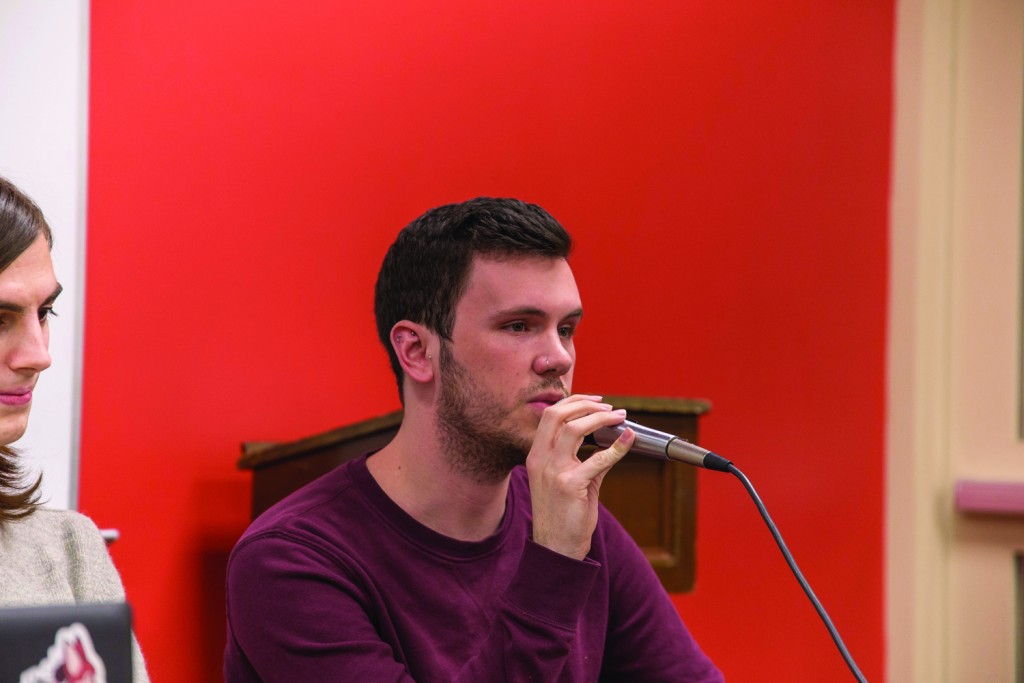For the past two years, Eastern conducted an official “Conversation on Human Sexuality,”a conversation that included faculty, students, and staff. The conversation began in the fall of 2014, when President Duffett called for the formation of a Human Sexuality Task Force. Dr. Duffett charged the Task Force to make recommendations regarding EU policies related to issues of sexuality. On April 8, at the final official event of the Conversation on Human Sexuality, the Task Force announced their recommendations.
Each recommendation was a response to a specific question. The first was an answer to the question of whether Eastern should add the words ‘gender’ and ‘gender identity’ to its statement of non-discrimination and equal opportunity. The Task Force collectively answered “no.” One member explained their reasoning: it’s not that Eastern wants to discriminate against people on the basis of gender or gender identity, but adding these words to the statement would legally require Eastern to begin collecting data on the genders of all students, staff, and faculty, which would in the end be rather invasive.
The next question that the Task Force addressed was the following one: Should the phrase “homosexual conduct” be removed from the examples of “moral turpitude” in the faculty handbook? The Task Force unanimously answered “yes.” Homosexual conduct, Dr. Phillip Cary explained, is a very vague term, and is not the kind of obvious example that should be included in such a list. The Task Force shared that they found the entire list rather vague, and they recommend that it be removed.
Next, the Task Force asked whether the qualification “anatomical” should be removed from the policy stating that students are assigned housing on the basis of sex. The answer was “yes.” Eastern will continue its policy of working with transgender students on a case-by-case basis to figure out what is best specifically for them and the students in their halls.
The final and most controversial issue revolved around the question, “Should the words ‘between a man and a woman’ be removed from the sentence ‘sexual intimacy is prohibited outside of marriage between a man and a woman’ in the student handbook?” The Task Force could not come to a unanimous decision. At the meeting on April 8, they announced that they would present two proposals to the president: one in favor of the removal, and one against. These were respectively labelled “A” and “B.” Proposal A reasons that the definition of marriage should be left undefined and up to the judgment of the individual Christian according to her tradition, in the same way that the definitions of “baptism” and “communion” are left undefined. Proposal B reasons that by “marriage” Christians have always meant “a specific and sacred union between a man and a woman,” and Eastern should not depart from it due to recent cultural pressure.
However, at the April 13 Refuge event, “LGBTQ Voices of Eastern: A Student Panel,” Dr. Landi Turner, a member of the Task Force, announced an update. The Task Force recommends an addendum to Proposals A and B: whatever the final decision may be, Eastern must find a way to keep all voices at the table. If Proposal A is chosen, conservative voices must not be silenced, and must still be respectfully heard. Alternatively, if Proposal B is chosen, progressive voices must also be protected and respectfully heard. Dr. Turner acknowledged that this does not settle the question at hand, and announced another change: rather than calling the proposals “A” and “B,” the Task Force will call them “the majority opinion” and “the minority opinion,” reflecting the different leanings of the Task Force members. The majority opinion is to remove “between a man and a woman,” and the minority opinion is to retain it.
At that same Refuge event, LGBTQ EU students responded to the Task Force recommendations. While many expressed gratitude for the Conversation on Human Sexuality, many were also dissatisfied that two years of talking has taken such a emotional toll on LGBTQ community members. Students expressed frustration that Eastern had not established something like the Task Force’s amended recommendation two years ago. The final decisions lay in the hands of Dr. Duffett and the Eastern Board of Directors.




